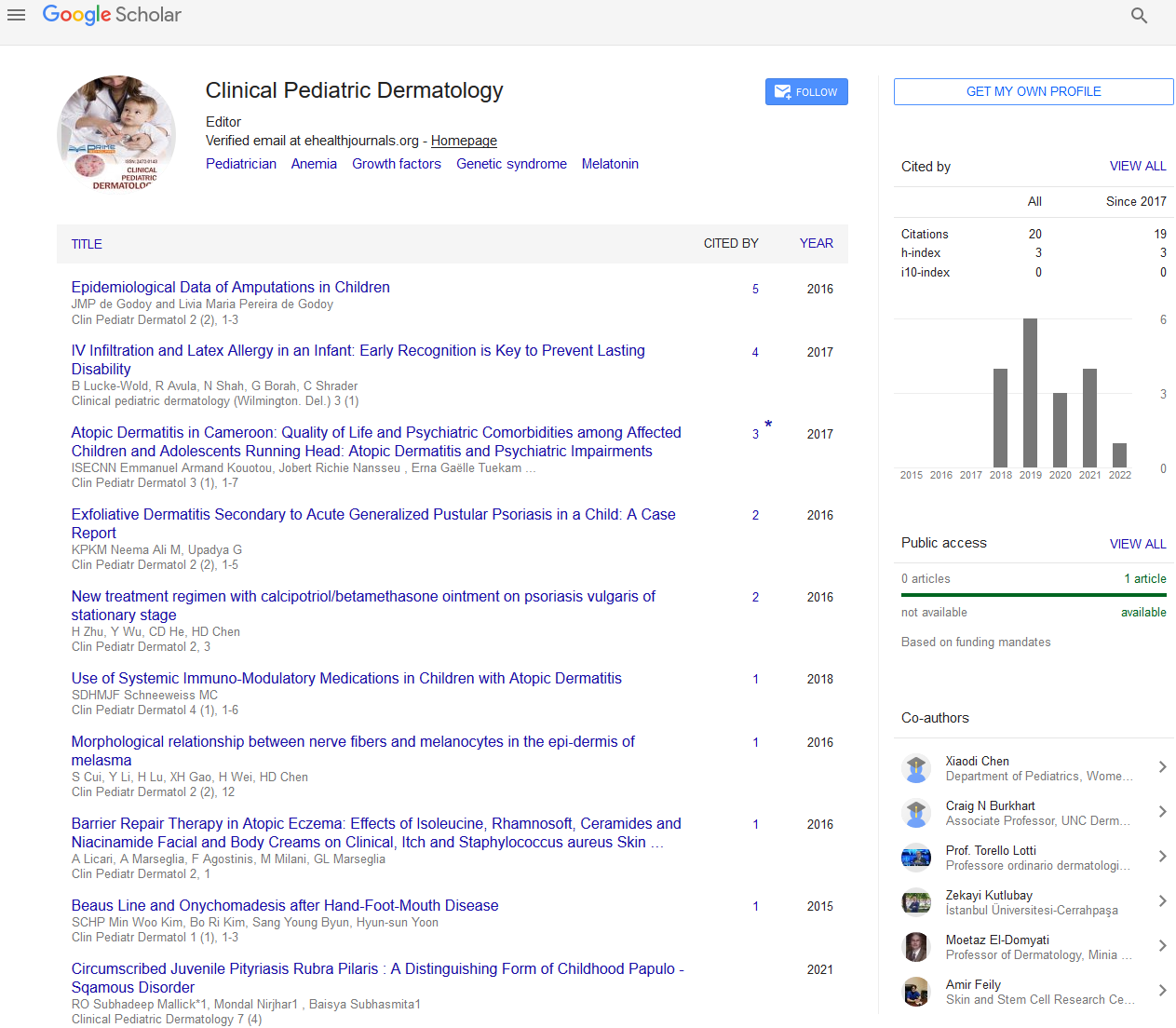Short Communication - (2023) Volume 9, Issue 4
Patterns in Introduction and Administration of Pediatric Renal Injury
James Treat*
Department of Paediatric Emergency Medicine, University of Warwick, UK
*Correspondence:
James Treat,
Department of Paediatric Emergency Medicine, University of Warwick,
UK,
Email:
Received: 29-Nov-2023, Manuscript No. IPCPDR-23-18664;
Editor assigned: 01-Dec-2023, Pre QC No. IPCPDR-23-18664 (PQ);
Reviewed: 15-Dec-2023, QC No. IPCPDR-23-18664;
Revised: 20-Dec-2023, Manuscript No. IPCPDR-23-18664 (R);
Published:
27-Dec-2023, DOI: 10.36648/2472-0143.9.4.33
Introduction
Pediatrics, the branch of medicine dedicated to the health and
well-being of children, is a field that encompasses a diverse range
of medical care tailored to the unique needs of infants, children,
and adolescents. From preventive care to specialized treatments,
pediatric healthcare plays a pivotal role in safeguarding the health
and development of our future generation. This article explores
the multifaceted aspects of pediatric healthcare, its significance,
challenges, and the evolving landscape of pediatric medicine. Pediatric
healthcare is fundamental to ensuring the healthy growth
and development of children. The unique physiological and psychological
characteristics of children require specialized medical
attention and care. Pediatricians focus on preventive measures
such as vaccinations, regular check-ups, and health screenings to
monitor growth milestones and detect any health issues early on,
preventing potential complications. Pediatric healthcare professionals
closely monitor children’s physical, cognitive, emotional,
and social development, providing guidance to parents and caregivers
to support healthy development. Pediatrics encompasses
the diagnosis and management of various childhood illnesses,
infections, chronic conditions, and injuries, tailoring treatments
to meet the unique needs of young patients. Pediatric healthcare
emphasizes family involvement, recognizing the critical role parents
and caregivers play in a child’s health [1-4]. Collaborative care
involving families ensures holistic support for the child’s well-being.
Description
Neonatal care focuses on the health and well-being of new-borns,
encompassing specialized care for premature infants, neonatal intensive
care, and support for infants with congenital conditions.
Serve as primary care providers for children, offering routine
check-ups, vaccinations, developmental screenings, and guidance
on nutrition, growth, and behavioural issues. Subspecialties within
pediatrics address specific medical needs, including pediatric cardiology,
neurology, oncology, gastroenterology, pulmonology, and
more, catering to complex medical conditions in children. Pediatric
healthcare integrates mental health services, addressing emotional
and behavioural concerns in children, providing support
for anxiety, depression, ADHD, autism, and other psychological
issues. Disparities in access to healthcare services, especially in
underserved communities, pose challenges in ensuring all children
receive timely and quality medical care. The rising prevalence of
childhood obesity and related health issues necessitates focused
efforts on nutrition education, healthy lifestyle promotion, and
obesity prevention initiatives. Addressing the increasing rates of
mental health disorders in children requires better access to mental
health services, early intervention, and destigmatization of
mental health issues. Outbreaks of infectious diseases, such as the
COVID-19 pandemic, highlight the need for robust preparedness,
vaccination strategies, and infection control measures in pediatric
healthcare [3,4]. Telehealth services and digital platforms facilitate
remote consultations, improving access to care and allowing parents
to seek medical advice conveniently.
Conclusion
Advancements in genomics enable personalized treatments and
targeted therapies for children with genetic disorders, offering
more effective and tailored interventions. Novel treatments, minimally
invasive surgeries, and innovative therapies enhance the
options available for pediatric patients, improving outcomes and
reducing recovery times. Advocacy efforts focus on policy changes,
funding for pediatric research, and initiatives aimed at addressing
healthcare disparities and ensuring child-friendly healthcare
systems. Pediatric healthcare serves as a cornerstone in nurturing
healthy, resilient, and thriving children. As we navigate the evolving
landscape of pediatric medicine, collaborative efforts among
healthcare providers, researchers, policymakers, and communities
are essential in ensuring that every child receives optimal care,
empowering them to reach their fullest potential.
Acknowledgement
None.
Conflict Of Interest
The author’s declared that they have no conflict of interest.
References
- Jones CP (2014) Systems of power, axes of inequity: Parallel, intersections, braiding the strands. Med Care. 52(10 Suppl 3):S71-S75.
[Crossref] [Google Scholar]
- Baumeister RF, Brewer LE, Tice DM, Twenge JM (2007) Thwarting the need to belong: Understanding the interpersonal and inner effects of social exclusion. Soc Personal Psychol Compass. 1(1):506-520.
[Crossref] [Google Scholar]
- Walton GM, Cohen GL (2011) A brief social-belonging intervention improves academic and health outcomes of minority students. Science. 331(6023):1447-1451.
[Crossref] [Google Scholar]
- Greenway KH, Cruwys T, Haslam SA, Jetten J (2015) Social identities promote well- being because they satisfy global psychological needs. Eur J Soc Psychol. 46(3): 294-307.
[Crossref] [Google Scholar]
Citation: Treat J (2023) Patterns in Introduction and Administration of Pediatric Renal Injury. Clin Pediatr Dermatol. 9:33.
Copyright: © 2023 Treat J. This is an open-access article distributed under the terms of the Creative Commons Attribution License, which permits unrestricted use, distribution, and reproduction in any medium, provided the original author and source are credited.

